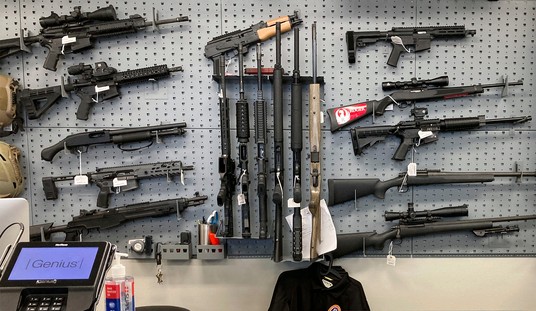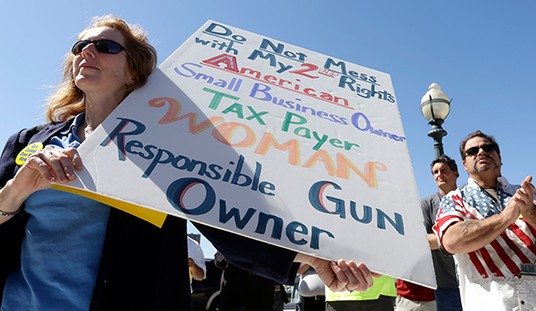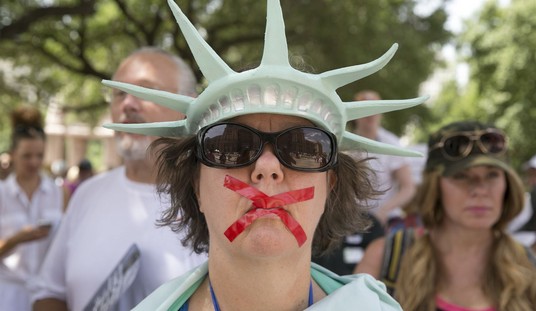Ohio Gov. Mike DeWine is up for re-election this year, and assuming he comes out on top in the Republican primary (which looks like a pretty safe bet), he knows that whoever his Democratic opponent is, they’re sure to try to make his support for Constitutional Carry an issue. It’s already come up during the last Democratic debate, where Dayton Mayor Nan Whaley and former Cincinnati Mayor John Cranley tried outdo each other’s hysterics over the measure.
The Democratic line of attack is that doing anything to buttress our right to keep and bear arms is a terrible thing, but it’s even worse given that violent crime is trending upwards in many cities across the state. DeWine’s response, at least so far, is to draw a sharp distinction between protecting a Constitutional right and targeting violent criminals, and earlier this week the governor unveiled a new tool for police that he’s hoping will lead to more arrests and convictions for violent crimes.
The state of Ohio will use about $10.5 million in coronavirus aid money to purchase nine new machines that analyze and compare bullets and other ballistic evidence to help solve crimes, Gov. Mike DeWine and Attorney General Dave Yost announced Thursday.
The new National Integrated Ballistic Information Network, or NIBIN, units will allow state and local law enforcement to analyze and report tiny markings on bullets, shell casings and other gun-related evidence and see if it matches evidence collected by other departments.
… There are already seven NIBIN units in Ohio, but only one is owned by the state – at the BCI’s lab in Richfield. The other six are owned by police departments and crime labs in Canton, Cincinnati, Cleveland, Columbus, Dayton and Toledo, according to Yost’s office.
Of the nine new units, five will be deployed to BCI labs in London, Bowling Green and Richfield, Yost said. Two will be used by the Ohio Highway Patrol, and two will be mobile units that can be sent on request to law-enforcement agencies in more rural areas of the state, such as Southeastern Ohio.
State officials will make the NIBIN units available to any of the 900-plus law enforcement agencies in the state, including smaller police departments who until now haven’t thought to use the machines in every case involving a gun.
“Many (law enforcement agencies) have made a decision that unless there’s some reason to think that ‘this gun was used in a homicide,’ many of them were just not doing it because of time, because of money,” said DeWine, a Greene County Republican, during the news conference. “And so what we are doing with this is giving them the tools.”
DeWine said he hopes that with the new NIBIN machines “it will become standard practice for law enforcement to have these (analyses) run,” resulting in more crimes solved and violent offenders taken off the streets.
We know that a small number of people are responsible for a disproportionate amount of violent crime, with one study finding that just 1% of the population commits 63% of violent crimes. The hope is that by using the NIBIN units more frequently, those superoffenders (for lack of a better word) might be more easily identified, or at least more of their crimes could be pinned to them. In turn, that theoretically results in a greater number of convictions and more time spent behind bars instead of preying on the public at large.
This is a good move for DeWine, but I don’t think he can stop here. As I wrote a couple of weeks ago, the governor needs to go on offense over Constitutional Carry and the Democrats’ plan to address crime through gun control.
Make his opponent explain why people should become criminals for bearing arms without first getting the blessing of their county sheriff, and help voters understand why Constitutional Carry, which applies only to legal gun owners, doesn’t aid violent criminals.
Should it really be a criminal offense to carry a gun without a permission slip from the government if you can legally own that firearm? And given that Ohio is already an open carry state, the question is really should it be a criminal offense to carry a legally owned gun that no one can see without first obtaining a government permission slip? Should people go to jail for that? Does Nan Whaley think that putting people in jail for carrying a gun without a permission slip is really a good way to fight crime? Really?
Here’s what this looks like in practice. Let’s talk about what’s going on in cities like Detroit. Nearly one third of the DA’s cases in Wayne County are concealed carry cases. The only charge the defendants are facing is carrying without a license, and 70% of those charged are legal gun owners. 97% of them, by the way, are black. Does John Cranley think that’s really an effective way to fight crime? Because to me, it looks a lot more like creating a crime out of a constitutional right (If I were on DeWine’s campaign team, I’d dispatch a couple of interns to gather the figures in Ohio cities like Dayton, Cleveland, Columbus, Toledo, and Cincinnati as well).
We need to focus on violent offenders instead of creating paperwork criminals. We need to have meaningful efforts to keep kids out of gangs and away from dealing drugs; two paths that dramatically increase the likelihood of becoming the victim or perpetrator of violence. We need to increase police resources, and put programs like Operation Cease Fire into place in our major cities. We need to bolster witness protection services, hire more prosecutors and more public defenders, and start to fix a broken criminal justice system with more than a legislative band aid or another gun control law.










Join the conversation as a VIP Member